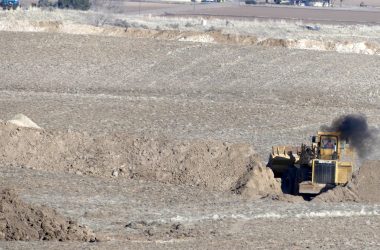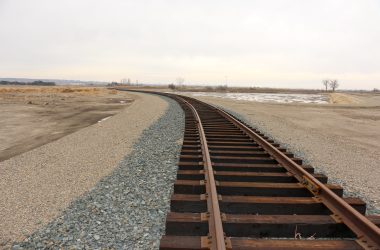The owners of Fort Boise Produce asked the county to pay them for not growing beans and corn on land they sold earlier to Malheur County, public records show.
County officials in April were presented with a bill for $17,875, representing what the owners, Farmer family, expected to earn in profits on the 25 acres they no longer planned to use in the 2022 harvest season. The invoice was disclosed recently by the Malheur County Economic Development Department in response to a public records request from the Enterprise. County officials said it has not been paid.
The acreage was part of a lease the Farmer family struck with Malheur County two years ago that allowed continued farming on more than 200 acres even though it had been sold to the county for industrial development.
There is little known about the special deal with the Farmers. Public record requests by the Enterprise resulted in only a handful of records – none showing why the land couldn’t be farmed and none explaining why county officials leased the ground at what appears to be a low rate without determining the going prices for such farmland.
Unanswered questions
“The land leased to the Farmer family was not a normal farm lease,” said Malheur County Judge Dan Joyce in responding to initial questions about the deal. He didn’t answer two subsequent sets of questions, saying he passed them on to the Farmers to address.
The arrangement draws attention in part because of previous dealings the Farmers had with Malheur County on this farmland. That included a 2018 sale at a price far higher than the appraised value and a special deal carving out five acres of what was being turned into prime, valuable industrial land at a price far below current estimates of its value.
“The land leased to the Farmer family was not a normal farm lease.”
–Malheur County Judge Dan Joyce
The sale and farming arrangement represent another confusing aspect of the Treasure Valley Reload Center, where government budgets are done with whiteout and colored pencils, bidding is set aside in favor of private bargaining, and the public cost continues to mount.
Jim Farmer, president of Fort Boise Produce in Idaho, for a time held a front-row seat as plans developed for the rail shipping center. He was one of the onion executives that county officials named to a new board to supervise construction of the center – the Malheur County Development Corp.
Farmer was still on the board when it picked the location for a reload center and the place to spend $26 million in state funding. The location: 290 acres of farmland north of Nyssa owned by Farmer and his relatives.
A deal, a resignation
Malheur County in July 2018 signed a deal to buy the property for $3 million, later borrowing about $2 million from the state and draining nearly $1 million out of its contingency fund.
Only after the deal was made did county officials get an appraisal. The property, the appraisal showed, wasn’t worth $3 million – it was worth about $1 million less.
Farmer resigned from the development company board in February 2019.
Deep into the sales agreement was a special deal for the Farmers. They kept the right to five acres, shaving $50,000 off their original sales price. That gave them the option at the first choice of five acres in what was becoming industrial land – worth substantially more than cropland.
Greg Smith, Malheur County economic development director, recently estimated the industrial ground was now worth $35,000 an acre – three times what it was worth at the time the Farmers reserved the land.
Only a portion of the property – about 65 acres – is needed for the reload center and new rail spurs.
The Farmers at about the same time struck a deal with the county to continue farming the rest of the property. Under the terms, the Farmers didn’t have to pay the county for the land. Instead, they had to pay the property taxes each year.
The lease covered 256 acres. The property tax bill for the 2021-2022 year was $8,000. That works out to about $39 an acre.
Agriculture experts say farmland in Malheur County typically leases for about $300 an acre.
No comparisons
Joyce couldn’t explain the terms of the lease.
The Enterprise asked for any record showing how the county established that the lease terms represented fair market value for the public. The answer from Joyce: “No records exist.”
The Enterprise asked for any record “showing any comparative values” for leasing farmland. The answer from Joyce: “No records exist.”
Questions about the arrangement were sent to the chief financial officer for Fort Boise Produce and to Jim Farmer. They didn’t respond.
With construction expected, the lease provided the county three ways to stop some or all of the farming. It could give the Farmers notice the lease would end in 90 days.
But the terms also provided that the lease could be ended with only 30 days’ notice – but that would cost the county.
If only short-term notice was given, the Farmers are entitled to get paid for “actual and direct costs and expenses for field work done.” The lease said there would be no compensation for “lost profits.”
County officials could provide no record of any notice to the Farmers but other documents obtained through public records requests from the Enterprise show that engineers grew concerned about some farming because of irrigation water.
Not long after construction started in December, crews ran into significantly more water than expected, including a wetland deeper than anticipated.
“Existing soils are moisture sensitive and is creating construction and access issues,” according to minutes of a Jan. 6 construction meeting involving engineers and contractors.
Engineers apparently didn’t anticipate how irrigation water for farming might worsen matters.
By late March, minutes showed engineers focused on nine acres in one portion of the industrial park.
At a meeting in early April, engineers reported that “irrigation ditches are starting to flow and has raised water levels around the project. Keep an eye on the groundwater levels around the site to be prepared for changing conditions.”
Sometime in April, the Farmers agreed to skip growing on that nine acres – and 17 more.
‘No work’ zone
Stephen Parrott, chief financial officer for the Farmers, wrote that “it was determined that the three identified fields were going to be occupied for the use of the construction project.”
Engineering maps show the farming fields were designated as “no work” zones.
Malheur County produced no record of any notice to the Farmers and officials with the county and Anderson Perry didn’t respond to questions about why the Farmers weren’t notified earlier to stop farming once the water issues became evident.
But on April 25, the Farmers addressed an invoice to Malheur County, seeking payment for not growing 10 acres of beans and 25 acres of corn – $17,875 for what was projected as “net income.”
Parrott explained in a later email that costs incurred before the farming started as “plowing/groundwork, bedding, planting, cultivating, labor, application, harvesting, maintenance repair, hauling.”
Parrott didn’t respond to questions about those costs and whether had been incurred before farming was stopped.
While the cost was billed to the county, Smith moved to pay the bill from state money awarded for the rail project.
Contact Editor Les Zaitz by email: [email protected]
EXCELLENCE IN JOURNALISM – Available for $7.50 a month. Subscribe to the digital service of the Enterprise and get the very best in local journalism. We report with care, attention to accuracy, and an unwavering devotion to fairness. Get the kind of news you’ve been looking for – day in and day out from the Enterprise.




